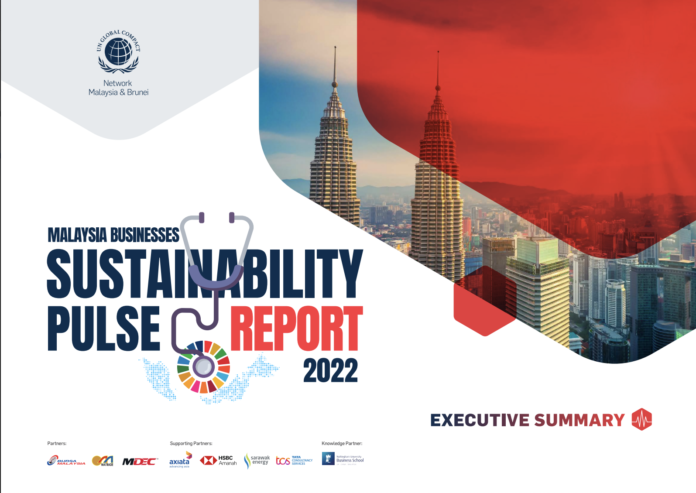Kuala Lumpur, 13 September 2022 – UN Global Compact Network Malaysia & Brunei (UNGCMYB) has recently launched the Malaysia Businesses Sustainability Pulse Report 2022, marking its official release. The Report is a multi-collaborative effort to address the private sector sustainability data gap and shed light on current sustainability trends within the Malaysian business ecosystem.
Led by UN Global Compact Network Malaysia & Brunei, the Malaysia Businesses Sustainability Pulse Report 2022 is a 6-month multi-collaborative effort between Bursa Malaysia, Malaysia External Trade Development Corporation (MATRADE), and Malaysia Digital Economy Corporation (MDEC), supported by Axiata, HSBC Amanah, Sarawak Energy and Tata Consultancy Services Malaysia, and a knowledge partnership with the Nottingham University Business School to examine the Malaysian private sector’s sustainability data gap within the current business ecosystem as well as to understand ongoing sustainability trends within the market. In turn, it is hoped that the report can guide decision makers to pave the way and craft effective policies towards improved sustainability performance within the market.
The Report, surveying 261 respondents (125 corporates, of which 88 are PLCs, 21 MNCs, 14 GLCs; and 121 MSMEs), highlights the business view that governments and customers are the key drivers of sustainability, with 45% of respondents considering dedicating resources towards being sustainable trade ready. Furthermore, 1 in 2 companies are also considering integrated sustainability performance measures in their reporting, recognising the value of incorporating Environmental, Social and Governance (ESG) related information into their performance measurement systems.
Despite the growing trends of Malaysian stakeholders’ sustainability demands, a shocking 45% of Malaysian companies had still not allocated a budget for sustainability initiatives, with 33% of Malaysian companies claiming a lack of sustainable financing plans. Furthermore, Sustainable Development Goals (SDGs) adoption remains worrying with nearly half (47%) of the Malaysian private sector indicating no commitments to the SDGs while 34% of businesses indicate that the SDGs are not relevant to their business. However, the report suggests that this may be due to the over emphasis on ESG as the common sustainability language for businesses, thus under prioritising the SDGs.
“Through this report, we hope to build a better understanding of the landscape and drivers in sustainability practices and strategies among Malaysia’s private sector,” said Faroze Nadar, Executive Director of UN Global Compact Network Malaysia & Brunei.
The private sector in Malaysia plays a pivotal role in driving sustainability practices and strategies to improve the sustainability landscape in Malaysia. Through adopting sustainability, they are also able to build their own competitiveness by meeting stakeholders’ expectations.
“Asia, on the whole, is on a slow trajectory to meet its sustainability targets, and there is still plenty of work to be done by all stakeholders in the community to deliver the equitable outcome the world urgently needs,” said Jeevan Rajoo, Country Head of Tata Consultancy Services Malaysia.
Datuk Hj Sharbini Suhaili, Group CEO of Sarawak Energy added, “We are fully committed to and are working towards embedding more sustainable practices in our business and operations and are benchmarking ourselves against the best in our industry to enable us to move closer towards our vision.”
“There is an increasing push for companies to adopt sustainable practices, driven by stakeholder pressures, growing regulation and the need for businesses to be climate-resilient. Given this, HSBC Amanah as a leading international financial institution is pleased to support this initiative to better understand the sustainability landscape in Malaysia and how we can help finance this transition,” commented Raja Amir Shah Raja Azwa, Chief Executive Officer of HSBC Amanah Malaysia Berhad.
“This collection of findings will aid gap analysis and identify areas of opportunities and challenges for cohesive and meaningful action by the private sector. At Axiata, we hope to enable meaningful conversations and considerations of both decision-makers and the public with information on how and where they can make a difference,” supports Vivek Sood, Joint Acting Group CEO and Group CFO of Axiata Group Berhad.
For more information or to access the Malaysia Businesses Sustainability Pulse Report, visit https://www.ungcmyb.org/malaysia-businesses-sustainability-pulse-report.
